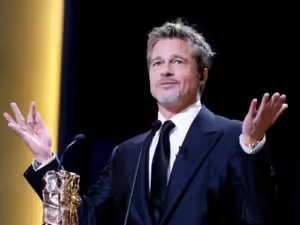
The Rise of Jaleel White
Jaleel White is best known for his iconic role as Steve Urkel on the beloved sitcom Family Matters.
His portrayal of the nerdy character made him a household name during the 1990s.
White’s journey in Hollywood began at a young age, and he quickly rose to fame, capturing the hearts of audiences everywhere.
However, the path to stardom is not always straightforward, and White’s experiences highlight the challenges faced by child actors.
Early Stardom and Its Challenges
White’s early success came with its own set of pressures.
After Family Matters, he was eager to transition into a writing career.
However, family expectations led him to pursue a college education instead.
This decision created obstacles that delayed his return to the entertainment industry.
Reflections on Will Smith
In his new memoir, Growing Up Urkel, Jaleel White opens up about his relationship with fellow actor Will Smith.
He discusses their initial camaraderie and the eventual fallout that occurred.
White’s reflections provide insight into the complexities of friendships in Hollywood, especially when external influences come into play.
The Moment of Falling Out
White recalls a pivotal moment when he had the opportunity to pitch a show to Smith.
This opportunity arose after Smith signed a production deal with Universal in the late ’90s.
However, despite their promising connection, White was discouraged by his agent and others from pursuing the collaboration.
He expresses regret for not reaching out to Smith directly, which he believes could have changed the course of their relationship.
External Influences on Their Relationship
The memoir reveals how external factors complicated White and Smith’s friendship.
After their initial meeting, Smith’s head of TV was relieved of his duties, creating uncertainty in their potential collaboration.
White felt the weight of the industry around them, which ultimately led to a breakdown in communication.
He reflects on how many people were involved in their situation, which made it difficult for them to connect directly.
Learning and Growth
Through writing his memoir, White has found a therapeutic outlet to express his feelings about these experiences.
He emphasizes the importance of self-reflection and how it has helped him grow as a person and an artist.
White’s journey illustrates the lessons learned from his time in the industry and the value of perseverance.
Aspirations for the Future
Looking ahead, Jaleel White expresses a desire to continue writing and acting.
He hopes to be involved in projects that resonate with audiences and bring joy and laughter.
White’s passion for storytelling remains strong, and he is eager to explore new opportunities in the evolving media landscape.
How Jaleel White’s Experiences as a Child Star Shaped His Career Choices
The Early Years
Jaleel White first captured the hearts of millions as Steve Urkel on the hit sitcom Family Matters.
Portraying Urkel was a defining moment in his life and career.
He was just a child when he auditioned for the role, stepping into a world full of lights, cameras, and celebrity.
This early exposure to fame came with both exciting opportunities and significant challenges.
The Impact of Family Matters
Family Matters premiered in 1989, and Jaleel quickly became the standout character.
Despite being a side character at first, Urkel’s popularity skyrocketed, and he became the show’s main attraction.
This sudden fame brought a unique set of expectations and pressures.
As a child star, Jaleel faced the challenge of growing up in the public eye, where every moment was scrutinized.
Challenges of Fame
The life of a child star is often glamorized, but it comes with its struggles.
Jaleel White experienced the pressures of fame at a young age, which influenced his career choices.
He had to navigate the demands of working long hours while attending school.
Balancing work and education was no easy feat and created stress that shaped his aspirations.
Pressure to Conform
Being a character like Steve Urkel, known for his quirky personality and trademark catchphrases, meant that Jaleel was often typecast.
This typecasting made it difficult for him to be seen as anything other than Urkel.
He felt the need to break free from this label to explore new opportunities in the industry.
This desire motivated him to pursue writing and other behind-the-scenes roles in entertainment.
The Identity Struggle
Growing up in the spotlight, Jaleel faced the challenge of forging his own identity.
As he transitioned into adulthood, he struggled with being recognized solely as his character.
This struggle pushed him to explore different facets of his talents, leading to a broader career path.
He realized that to succeed in the industry, he needed to redefine himself beyond his childhood role.
The Shift to Writing and Production
Post-Family Matters, Jaleel White embraced writing and sought to have more control over his career.
He understood that acting alone was not enough to fulfill his creative aspirations.
This shift allowed him to explore storytelling from a different perspective and collaborate with others in the industry.
Learning from Experience
Through his experiences, Jaleel learned valuable lessons about the entertainment industry.
He recognized the importance of networking and forming relationships beyond acting roles.
His desire to work with other creatives helped expand his understanding of entertainment as a whole.
This knowledge informed his subsequent decisions and led to greater fulfillment in his work.
Continual Growth and Exploration
Jaleel White’s journey is a testament to the power of perseverance and adaptation.
He continues to explore various opportunities in writing, acting, and producing.
Dedicated to his craft, Jaleel openly discusses his challenges and the lessons he’s learned along the way.
His story encourages others to pursue their passions, regardless of the obstacles they face.
Goals for the Future
As he moves forward, Jaleel remains open to new projects that resonate with him personally.
He aims to provide audiences with laughter and joy through engaging storytelling.
His enduring passion for creativity drives his desire to remain an influential part of the entertainment industry.
Lessons Learned from the Falling Out Between Jaleel White and Will Smith
The Importance of Direct Communication
One of the most significant lessons from the fallout between Jaleel White and Will Smith is the critical role of direct communication in professional relationships.
When Jaleel had the chance to pitch a show to Will, he was discouraged by external sources, including his agent, from pursuing that connection further.
This miscommunication ultimately led to frustration and missed opportunities for both parties.
Had Jaleel reached out to Will directly, they might have resolved misunderstandings before they escalated.
Navigating Relationships in Hollywood
The entertainment industry is known for its complex network of relationships.
In this dynamic environment, relying on intermediaries, such as agents or managers, can sometimes lead to confusion.
Direct conversations can clarify intentions and maintain the authenticity of the relationship.
Jaleel’s experience suggests that taking the initiative to communicate openly can prevent misunderstandings and preserve valuable connections.
External Influences and Their Impact
Another lesson from their situation is understanding how external influences can shape professional relationships.
Jaleel White mentioned in his memoir that various people surrounded his initial discussions with Will Smith, which created unnecessary barriers.
Once Will’s head of TV was relieved of his duties, it complicated their potential collaboration, demonstrating how factors beyond one’s control can impact relationships.
Being aware of these external pressures is essential in navigating Hollywood’s complex web.
Recognizing the Bigger Picture
Jaleel’s reflections highlight the importance of recognizing how outside influences can impact personal and professional decisions.
Understanding these dynamics helps individuals make informed choices, especially in a competitive industry.
Learning to identify the variables that affect relationships can empower professionals to take proactive steps to manage their networks better.
The Significance of Mentorship
The relationship between Jaleel White and Will Smith also underscores the significance of mentorship in the entertainment industry.
From the beginning of his career, Jaleel admired Will’s talent and success.
However, due to the fallout, that mentorship opportunity was diminished, leaving Jaleel to rethink his approach to seeking guidance from established figures in Hollywood.
Influence and support from seasoned professionals can be invaluable, especially for young actors and creatives.
Building and Maintaining Mentorship Relationships
Mentorship is a two-way street that requires effort from both parties.
Jaleel’s experience serves as a reminder that maintaining connections with potential mentors is crucial for growth in any career.
Open communication can solidify these relationships, providing a foundation for future collaboration and guidance.
Recognizing potential mentors and fostering those relationships can significantly benefit an individual’s career trajectory.
Growth Through Reflection
Ultimately, Jaleel White’s reflections on his fallout with Will Smith showcase the power of growth through self-reflection.
Writing his memoir allowed him to express his thoughts and emotions about the past, offering a therapeutic outlet.
This process enabled him to understand what went wrong, both in terms of his actions and the dynamics of the industry.
Embracing reflection helps individuals learn from their experiences and adapt their approaches moving forward.
Encouraging Personal Growth
Taking the time to reflect on one’s experiences is essential for personal and professional growth.
Jaleel’s journey illustrates the importance of viewing challenges as opportunities for learning.
This mindset allows individuals to evolve, enabling them to make better choices in the future.
Reflective practices empower professionals to navigate their careers with greater insight and intention.
How External Influences Impact Relationships in the Entertainment Industry
Understanding External Influences
In the entertainment industry, external influences can significantly shape how relationships are formed, maintained, and sometimes fractured.
These influences include agents, managers, producers, publicists, and even social media.
Understanding these external factors helps highlight how they play a crucial role in the dynamics of professional relationships.
Often, the network of people surrounding an artist or actor can dictate the nature and course of their professional interactions.
The Nature of External Influences
External influences can be both positive and negative, affecting how individuals perceive one another.
Positive influences might include mentorship from experienced professionals or support from industry peers.
Conversely, negative influences can result from rumors, miscommunication, or pressure from publicists and managers.
Recognizing these influences is essential for anyone navigating the entertainment landscape.
The Role of Agents and Managers
Agents and managers are often the gatekeepers in the entertainment industry.
They negotiate contracts, schedule meetings, and help shape an artist’s public image.
Their influence can dramatically affect the relationships artists have within the industry.
When agents and managers foster strong connections, they can facilitate collaborations and opportunities.
Navigating Conflicts of Interest
However, conflicts of interest can arise when agents prioritize their own agendas over their clients’.
If an agent is more focused on securing a lucrative deal rather than nurturing relationships, it can lead to tension.
These tensions may manifest in how projects are pitched, leading to misunderstandings between artists and their peers.
Understanding the motivations of agents and managers is vital for professionals in the entertainment field.
Creating Barriers to Direct Communication
Agents and managers can unintentionally create barriers to direct communication.
When artists rely solely on their representatives to communicate, important messages can get lost or misinterpreted.
This reliance can hinder the development of personal relationships, which are crucial for collaboration.
Encouraging direct communication can help overcome these barriers and strengthen ties between artists.
The Impact of Public Perception
Public perception plays a significant role in shaping relationships within the entertainment industry.
How an artist is viewed by the public can dictate their opportunities and partnerships.
When artists are popular, they may attract positive relationships that can further their careers.
Conversely, negative public sentiment can lead to isolation and strained professional relationships.
Media Coverage and Its Consequences
Media coverage can amplify or diminish an artist’s reputation, often influencing their relationships.
For example, negative press can create a stigma around working with an artist, leading to fewer opportunities for collaboration.
The stories told in media can form perceptions that may not accurately reflect an artist’s true character.
Navigating these perceptions is vital for maintaining healthy professional relationships.
Social Media’s Role in Shaping Perspectives
In today’s digital age, social media adds another layer of complexity to public perception.
Celebrities are constantly under scrutiny, and their interactions online can influence how others in the industry see them.
Positive engagement on social media can foster relationships, while negative interactions can lead to backlash.
Understanding the power of social media is crucial for artists looking to navigate their relationships effectively.
The Power of Network and Connections
Relationships in the entertainment industry are often built on personal networks and connections.
Who you know can be just as important as what you know.
Building a robust network can open doors for collaboration and opportunities.
On the flip side, a weak or negative network can hinder an artist’s ability to form meaningful working relationships.
The Importance of Referrals and Recommendations
Referrals and recommendations from industry insiders can significantly impact an artist’s reputation.
A positive recommendation from a respected figure can lead to new opportunities and partnerships.
However, if an artist has a negative reputation, it can deter others from working with them, limiting their prospects in the industry.
This aspect of networking illustrates the importance of maintaining a good reputation.
The Role of Industry Events
Industry events, such as film festivals and award shows, are crucial for building relationships.
These events provide opportunities for artists to meet, collaborate, and establish connections with peers and industry leaders.
Being present and engaged at these events can impact an artist’s career, facilitating opportunities that may never arise otherwise.
Understanding how to navigate these social settings can empower individuals to forge valuable relationships.
This revised article includes links to relevant topics and sources, enhancing the reader’s understanding and providing additional context where appropriate.



















